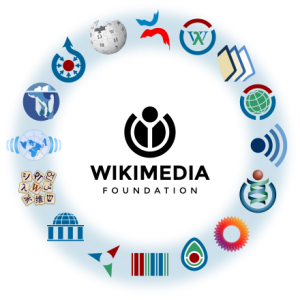Authentic Assessment
Wikis Provide a Rich Environment for Collaborative Open Educational Practices: Motivation and Emotion Case Study
University of Canberra
Dr James T. Neill
Overview
Wikis provide a rich, but surprisingly underutilised digital environment for collaborative development of open educational resources (OERs). Open wiki platforms, such as hosted by the Wikimedia Foundation (WMF), can be used to engage in renewable (Grey, 2023) learning and assessment exercises with higher education students.
To demonstrate the educational potential of open wiki platforms, this chapter presents a case study of an ongoing project which has developed over 1,500 online, interactive, editable book chapters authored by students about the psychological science of motivation and emotion.
![]() Visit the book Motivation and Emotion book (Wikiversity)
Visit the book Motivation and Emotion book (Wikiversity)
Each student develops an online book chapter about a unique topic as a learning and assessment exercise. This is an innovative alternative to traditional, disposable (Wiley, 2013) essay writing.
The project’s OER-enabled andragogical philosophical and educational principles, and its approach to scaffolding and student support, can be readily adapted across disciplines and levels of higher education (Neill, 2024).
Engaging students and educators in collaborative authoring via open wikis contributes maximally flexible and sustainable OERs to the knowledge commons and develop students’ 21st century digital literacy and communication skills (Neill, 2024). Open wikis offer ideal platforms for open andragogy and open educational practices because they provide resources that are free and open for anyone to edit and the licensing allows re-use for any purpose.
![]() Watch a webinar: Wikis in open education: A psychology case study (24 mins) (Neill, 2023).
Watch a webinar: Wikis in open education: A psychology case study (24 mins) (Neill, 2023).
Using this case study
This chapter provides an overview of how renewable assignments can be published openly using wikis. After reading this chapter:
- Academic staff will: Develop awareness of the benefits and processes for facilitating quality student authentic assessments published as OERs
- Library staff will: Learn strategies and techniques for working with students and academics to innovate and publish high quality student created content.
Key stakeholders
Key stakeholders for the Motivation and Emotion online book project are shown in an onion model (see Figure 1):

- At the core is an inspired academic educator with values rooted in open andragogy (Clinton-Lisell, 2021).
- Second, there are cohorts of students enrolled in a specific university coursework unit (in this case, 7124 Motivation and Emotion at the University of Canberra).
- Third, there is a broader community of people who voluntarily edit Wikiversity and its WMF sister projects (see Figure 2) and who contribute by responding to student questions, editing, and providing feedback.
- Finally, the broadest stakeholder group consists of all future users of the knowledge commons; these are people, but increasingly also bots that search for, access, and use free content on the internet.

This human-digital ecosystem provides a rich, holistic environment with dynamic nutrients (e.g., editable, flexible, sustainable, reliable) for facilitating immersive learning experiences for students and developing OERs.
Background information
The student-authored motivation and emotion book project was a response to some fundamental problems with widespread use of traditional, disposable essays in higher education. The project demonstrates how educators can guide student cohorts through simultaneous mass development of individually unique works in a publicly editable, wiki-based, online platform.

Use of disposable (Wiley, 2013) essays for assessment in higher education is problematic for several reasons:
- Traditional essays are typically hidden during the drafting process, limiting potential for formative feedback and peer-to-peer learning.
- Traditional essays usually involve an educator setting a single or small number of permissible topics, leading to repetition across students and over time, pumping out student essays like a sausage factory (see Figure 3). Cookie-cutter approaches to education can be demotivating for students as they lack authenticity and heighten the risk of academic integrity violations such as plagiarism and contract cheating.
- Traditional essays typically never see the light of day, even though their publication could potentially offer many benefits (Fatayer & Tualaulelei, 2023; Weller, 2011).
- Traditional essays are usually written individually, whereas much professional writing in the real world is collaborative and involves version tracking, commenting, and interactive discussion.
- Traditional essays usually consist of plain text which does not use the rich, interactive potential of the internet (e.g., hyperlinks, images, multimedia, comments). Furthermore, a general skill that students arguably should learn during higher education is how to contribute to the knowledge commons.
Use of traditional essay writing in higher education is increasingly problematic and is arguably an outdated approach. With the advent of the internet, writing skills can be developed, and much other learning can be facilitated, by engaging students in making unique contributions to the knowledge commons. Open wikis offer an ideal tool for collaborative online development of OERs.
Project description
The motivation and emotion student-authored book project started in 2010, with approximately 100 to 150 students participating each year since. Each cohort of students author online book chapters about specific motivation and emotion topics as a major part of the assessment for a third-year undergraduate psychology unit, motivation and emotion.
The unit’s learning outcomes are to:
- Identify the major principles of motivation and emotion,
- Integrate theories and current research towards explaining the role of motivation and emotions in human behaviour, and
- Critically apply knowledge of motivation or emotion to an in-depth understanding of a specific topic in this field.
The project is scaffolded (see Table 1) to support students’ editing skills, enhance their confidence, and develop content (Neill, 2024):
- Lectures introduce the rationale for a capstone-style, major project curated in a public space in order to develop and showcase students’ writing and publishing skills and disciplinary knowledge.
- Tutorials teach useful skills such as creating a Wikiversity account, signing up to or negotiating a topic, basic wiki editing, and importing a template to help scaffold a chapter.
After selecting or negotiating a topic, students develop a chapter plan which is submitted as an early assessment. This helps students to develop their wiki editing skills by presenting headings and sub-headings, key points, and initial citations about the topic. Students are also taught how to contribute to other chapters by editing and commenting. These social contributions are logged on their user page and used as part of the marking criteria for the book chapter (Neill, 2024).
All book chapters have unique titles and sub-titles in the form of a question (e.g., Music and study: What effect does music have on motivation to study?). Approved topics are listed in the volume’s table of contents. All volumes can be searched and browsed via the book’s home page. The book theme is “Understanding and improving our motivational and emotional lives using psychological science”.
In addition to written text, each chapter includes interactive “learning features” (e.g., internal and external hyperlinks, figures, tables, and quizzes). These features help to bring chapters to life and further distinguish the work from traditional essays.
Once the final book chapter is submitted, students develop a three-minute multimedia overview of the chapter, a link to which is featured underneath the chapter’s title and sub-title.
| Item (weight) | Description |
| 1: Topic selection (0%) | Ungraded early assessment exercise. Create a Wikiversity account. Sign up to a major project topic. Ask clarifying questions. |
| 2: Topic development (10%) | Develop plan for book chapter: Overview, Headings, Key points, Figure, Learning feature, Resources, References, User page, Social contribution. |
| 3: Book chapter (45%) | Author an online book chapter up to 4,000 words about a unique motivation or emotion topic. Includes a social contribution component. |
| 4: Multimedia presentation (20%) | Record and share a 3 minute online multimedia presentation focusing on key problems and answers provided by psychological science. Same topic as book chapter. |
*The other 25% of the assessment is allocated to quizzes across the breadth of unit content.
Key outcomes
The key project outcomes are:
- high student satisfaction with novel, capstone experience
- development of students’ disciplinary knowledge and graduate attributes (including communication skills, global citizenship, and lifelong learning)
- contribution of OERs to the knowledge commons
- working demonstration of a renewable assessment alternative to traditional essay-based learning and assessment exercises in higher education (Neill, 2024).
These outcomes are mapped against 7 of the 17 United Nations’ 2015 Sustainable Development Goals (see Table 2).
| SDG # | SDG Name | How Student-developed Open Wiki OERs Contribute |
|---|---|---|
| 4 | Quality education |
|
| 5 | Gender equality |
|
| 8 | Decent work and economic growth |
|
| 9 | Industry, innovation, and infrastructure |
|
| 10 | Reduced inequality |
|
| 16 | Peace, justice, and strong institutions |
|
| 17 | Partnerships for the goals |
|
The next steps for the project are to:
- continue developing annual volumes about new motivation and emotion topics
- promote the model’s philosophy and practice to encourage wider adoption
- support educators who are interested to adapt the model
- continue refining the model to respond to student feedback and institutional policy changes.
Learning and recommendations
Getting started with developing open wiki-based OER projects is straightforward. WMF wikis are free, stable, and open for anyone to edit. Content on these wikis is maximally editable and reusable, satisfying the criteria for free cultural works (Creative Commons, n.d.). Wikiversity is dedicated to teaching, learning, and research. Other WMF sister projects can also be used for specific educational projects, including Wikibooks, Wikimedia Commons, Wikidata, and Wikipedia.
The main challenges to be navigated include:
- developing educators’ open andragogical teaching philosophies and rationales for open wiki projects
- developing educators’ wiki editing skills and confidence that they can support students
- considering intellectual property rights and copyright policies of higher education institutions and how they apply to staff and students
- willingness to step off the well-worn treadmill of students submitting disposable assignments through learning management systems.
Champion statements
Student feedback about the motivation and emotion unit and its OER book chapter project is publicly available. In 2023, 95% of students who responded to the official end-of-semester survey indicated that they were satisfied with:
- the quality of the unit
- how the staff in the unit supported their learning
- the unit helping them with their work-related goals.
A typical comment about the book chapter exercise was:
“The book chapter is one of the most interesting assessment items in the psychology degree. It tests our knowledge of psychology theories and our ability to write for a different audience while allowing some exploration.” (Anonymous, Q5T3 end-of-semester survey)
In practice
Based on experiences guiding over 1,500 students in building wiki-based OERs as part of their learning and assessment, the following advice/tips are offered to educators:
- Teaching philosophy: Develop a personal teaching philosophy which is explicit about your values. Include why you do (or don’t) contribute OERs and engage students in renewable, OER-based assignments.
- Start small. Create a free WMF user account, then have a go at editing and asking questions. Start small, tinker, build your skills and confidence, iterate, reflect, and scale up over time.
- Community engagement Engage with the wiki editing community on the hosting platform via discussion, collaborative editing, and mentoring.
- Share actively: Share about the OERs you are involved in developing via social media, seminars, teaching and learning journals, etcetera. They will also be discoverable via internet search.
- Scaffolded agency: Allow students as much control and decision-making as possible, whilst also providing scaffolding and feedback.
- Foster community: Communicate care and micro-encouragements towards students through helpful actions (e.g., likes, editing, and feedback). It is natural for students to be hesitant to engage at first, because of previous experiences of controlled, constrained forms of learning and assessment.
- Learning curve: Developing open educational practice skills with open wikis may seem daunting and time-consuming at first, but wiki editing skills lead to many efficiencies and benefits in teaching, research, and social impact that pay off in the longer-term.
Further resources
- English Wikiversity
- Motivation and emotion – Homepage
- Motivation and emotion – Book project
- Motivation and emotion – Unit description
Notes
The images used in this chapter are scalable vector graphics (SVG) which allows them to be edited, maximising their openness, accessibility, and utility.
A table titled “Motivation and Emotion Book Chapter Project Scaffolding” outlines assessment items, weights, and descriptions. The items and weights are as follows:
- Topic Selection (0%): Ungraded early exercise. Students create a Wikiversity account, select a project topic, and ask clarifying questions.
- Topic Development (10%): Students develop a plan for their book chapter, including an overview, headings, key points, a figure, a learning feature, resources, references, a user page, and a social contribution component.
- Book Chapter (45%): Students write a 4,000-word online book chapter about a unique motivation or emotion topic, with a social contribution element.
- Multimedia Presentation (20%): Students create a 3-minute online multimedia presentation highlighting key problems and solutions discussed in psychological science, using the same topic as their book chapter.
A table titled “Mapping of Student-developed OERs via Open Wikis to the Sustainable Development Goals” lists Sustainable Development Goal (SDG) numbers, names, and contributions of student-created Open Educational Resources (OERs).
The entries are as follows:
- SDG 4, Quality Education: Contributions include innovative teaching and learning practices, development of globally accessible OERs, and fostering active, lifelong learning.
- SDG 5, Gender Equality: Ensures equal access to educational resources for all genders and promotes contributions to the knowledge commons by students of all genders.
- SDG 8, Decent Work and Economic Growth: Supports workforce skill development; licensing under CC-BY-SA 4.0 and GFDL allows commercial reuse, aiding economic growth.
- SDG 9, Industry, Innovation, and Infrastructure: Connects higher education with the non-profit Wikimedia Foundation and promotes industry-relevant skills through collaborative OER production.
- SDG 10, Reduced Inequality: Provides free and open access to diverse educational resources, including varied topics, voices, and perspectives.
- SDG 16, Peace, Justice, and Strong Institutions: Resources are developed transparently with participatory engagement, encouraging democratic collaboration.
- SDG 17, Partnerships for the Goals: Facilitates open-access knowledge sharing on a multilingual platform, contributing to scientific knowledge dissemination.
Acknowledgement of peer reviewers
The authors gratefully acknowledge the following people who kindly lent their time and expertise to provide peer review of this chapter:
- Mais Fatayer, Learner Experience Design Manager, University of Technology Sydney
How to cite and attribute this chapter
How to cite this chapter (referencing)
Neill, J. T. (2024). Wikis provide a rich environment for collaborative open educational practices: Motivation and emotion case study. In Open Education Down UndOER: Australasian Case Studies. Council of Australian University Librarians. https://oercollective.caul.edu.au/openedaustralasia/chapter/wikis-provide-a-rich-environment
How to attribute this chapter (reusing or adapting)
If you plan on reproducing (copying) this chapter without changes, please use the following attribution statement:
Wikis provide a rich environment for collaborative open educational practices: Motivation and emotion case study by Dr James T. Neill is licensed under a Creative Commons Attribution 4.0 International licence.
If you plan on adapting this chapter, please use the following attribution statement:
*Title of your adaptation* is adapted from Wikis provide a rich environment for collaborative open educational practices: Motivation and emotion case study by Dr James T. Neill, used under a Creative Commons Attribution 4.0 International licence.
References
Clinton-Lisell, V. (2021). Open pedagogy: A systematic review of empirical findings. Journal of Learning for Development, 8(2), 255–268. https://doi.org/10.56059/jl4d.v8i2.51
Creative Commons. (n.d.). Understanding free cultural works. https://creativecommons.org/public-domain/freeworks/
Fatayer, M., & Tualaulelei, E. (2023). Making the most of cognitive surplus: Descriptive case studies of student-generated open educational resources. Education Sciences, 13(10), 1011. https://www.mdpi.com/2227-7102/13/10/1011
Grey, A. (2023, May 4). Building-in student buy-in: Disposable vs renewable assignments. Pedagogy + Practice. https://wordpress.kpu.ca/tlcommons/building-in-student-buy-in-disposable-vs-renewable-assignments
Neill, J. T. (2023, June 13). Wikis in open education: A psychology case study [Webinar]. ASCILITE Open Educational Practices SIG. https://oepoz.wordpress.com/2023/05/31/webinar-4-the-untapped-power-of-wikis-for-open-education-and-information-literacy/
Neill, J. T. (2024). Collaborative authoring using wiki: An open education case study. International Journal of Students as Partners, 8(1), 224–232. https://doi.org/10.15173/ijsap.v8i1.5417
Weller, M. (2011). A pedagogy of abundance. Revista Española de Pedagogía, 69(249), 223–235. http://dx.doi.org/10.22550/2174-0909.3602
Wiley, D. (2013, October 21). What is open pedagogy? Improving Learning. https://opencontent.org/blog/archives/2975
Wiley, D., & Hilton III, J. L. (2018). Defining OER-enabled pedagogy. International Review of Research in Open and Distributed Learning, 19(4), 133–147. https://doi.org/10.19173/irrodl.v19i4.3601



